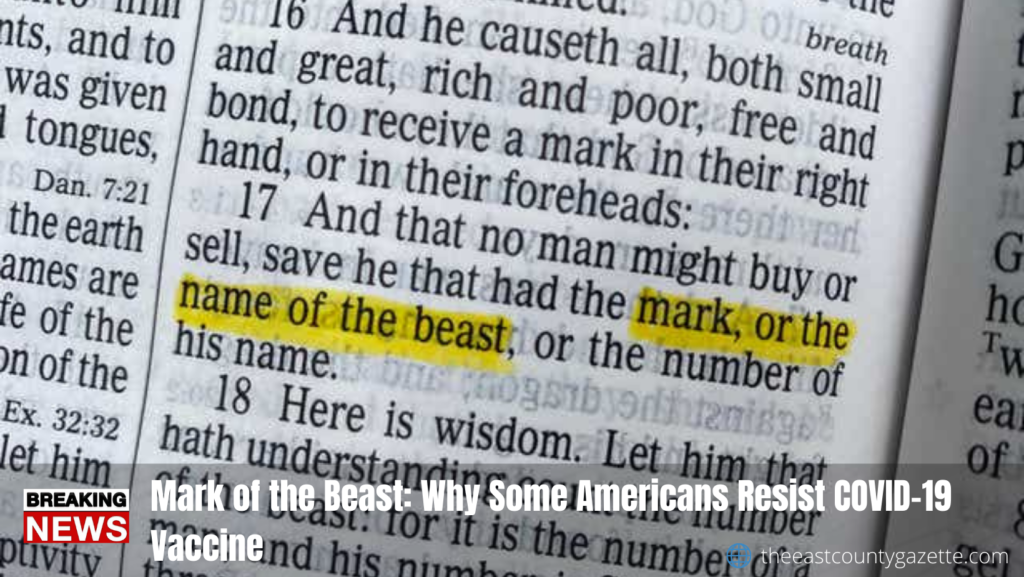The COVID-19 vaccine has been scientifically proved to save lives, but for a select group of people in the religious realm, a more important matter is at stake – eternal salvation.
Peter Feaman, a top Republican National Committee official in Florida, said last month that vaccines are “the mark of the beast” and comparable to a “false god”. In May, Feaman wrote on his blog of Governor Gretchen Whitmer encouraging vaccines in Michigan: “Diabolical Michigan Governor Whiter wants her citizens to get the Mark of the Beast to participate in society”.
The “mark of the beast” in the New Testament’s Book of Revelation signals allegiance to Satan or those who reject God. “Studies show that any conflicts between religion and science are not about facts, they are more about values and morals,” said John Evans, a professor of sociology and religious studies at the University of California, San Diego.
According to Evans’ studies, the majority of “mark of the beast” believers appear to be politically conservative and from Protestant Christian backgrounds.
“People with spiritual beliefs that all things are influenced by religion are more likely to believe ‘mark of the beast’, which is in every Christian’s Bible, but people will focus on particular passages in the Bible to support their belief system,” Evans said.
Recommended Read: A Texas City Becomes First in the State to Reach COVID-19 Herd Immunity
What does the ‘mark of the beast’ scripture in Revelation say?
The apocalyptic biblical term comes from Revelation 13: 16-18. According to the Apostle John in the New International Version Bible, a pair of beasts will rule the Earth with cruelty.
Their evil reach – which can be interpreted as hidden manipulation – will require all people who engage in commerce to wear the mark of the beast. The Apostle John did not identify what the mark looks like, although some theologians translate Scripture to associate the number “666” with it.
Why do people call the COVID-19 vaccine the ‘mark of the beast?’
Evans said that lack of trust in the government and medical field is a driving force behind the “mark of the beast” belief.
“(Former President) Donald Trump tapped into American populism, and with that comes the disbelief of experts,” Evans told USA TODAY. “There is a small group of people who believe in ‘the mark of the beast,’ and I think what’s driving that thought process is starting with various concerns about receiving the coronavirus vaccine that is not specifically religious.”
Recommended Read: New State Rule: Parents to Decide Quarantine for COVID-19 Exposed Students
What do Religious Leaders Say?
Harvest Christian Fellowship Pastor Greg Laurie said COVID-19 vaccines are not “the mark of the beast,” but many Christians may believe they are, thinking the world is in what the Bible calls “the last days.”
“The Bible speaks of someone identified as the ‘Antichrist’ and he will require people to have a ‘mark’ that people will receive to buy and sell,” Laurie told USA TODAY in an email. “The COVID-19 vaccine – or any vaccines – have nothing to do with any of this.”
Misinterpretations of Revelation 13:16-18 can stem from social media where people can spread unreliable information, according to Laurie.
“People read erroneous comments and believe they are true,” he said.
“Sometimes these statements are packaged to look like Bible Prophecy,” he said, “but they are false and misapplied because many people do not understand what the Bible actually says about these things.”
Recommended Read: CDC: COVID Can Spread Quickly Among Groups of Vaccinated Individuals
What do healthcare workers say? Do people actually cite this as a reason to avoid the shot?
Nicole Williams, a traveling intensive care unit nurse, said she has heard the “mark of the beast” as a reason not to get vaccinated many times.
“I get being hesitant because it is new and we don’t know the long-term effects, but calling it the ‘mark of the beast’ is crazy,” Williams told USA TODAY.
Emergency room physician Stephen Smith at Hennepin Healthcare told USA TODAY he hasn’t heard the ‘mark of the beast’ as a reason to not get vaccinated but a few other outlandish reasons.
“Social media plays a 100% role in the misconceptions about the vaccine,” Smith said. “They get all their information off Facebook and get all this garbage.

